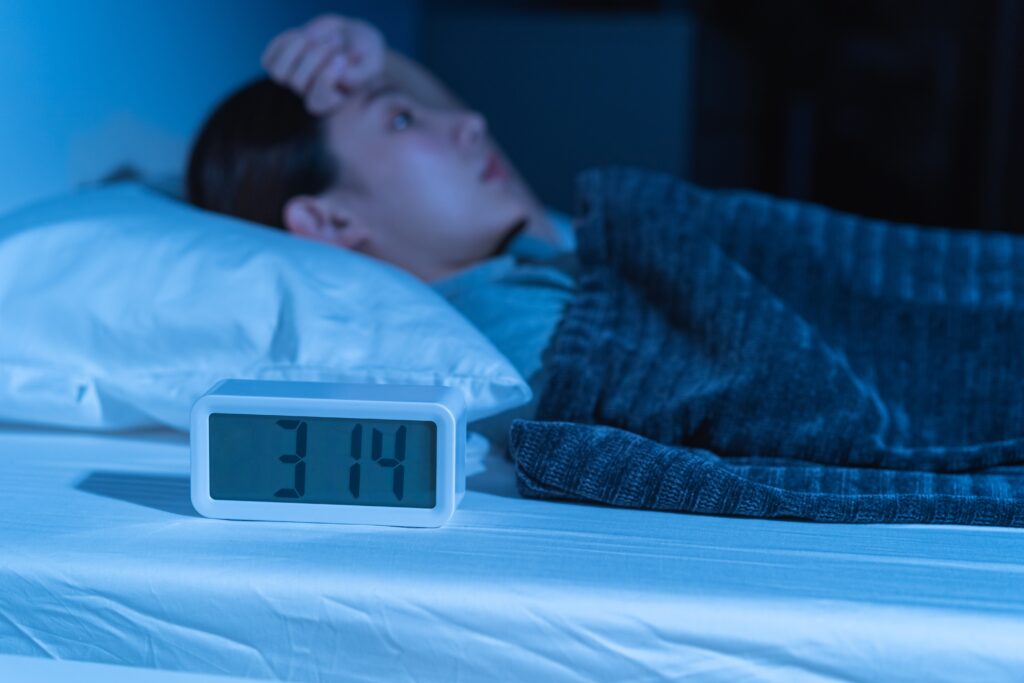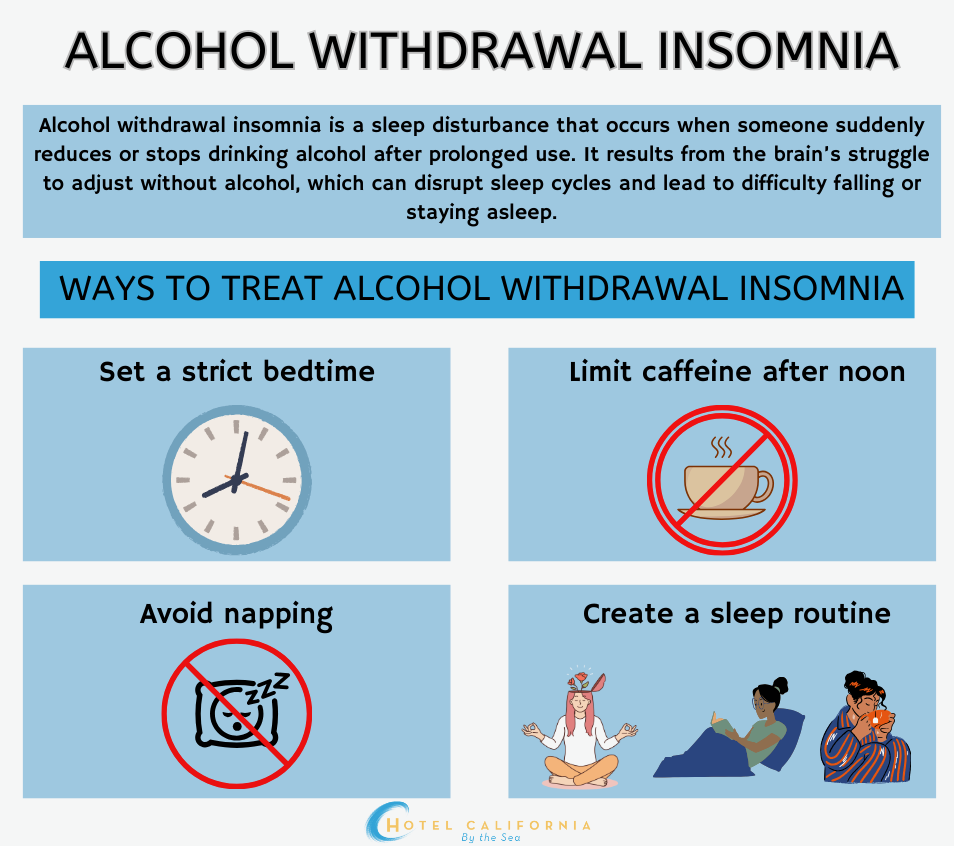Insomnia from Alcohol Detox
Alcohol detox and withdrawal can be a very difficult and uncomfortable process to experience. One symptom that many people in treatment experience is insomnia-related alcohol detox. In fact, insomnia and other sleep disturbance disorders are highly linked to alcohol detox and alcohol withdrawal during the early stages of recovery. It is a very common symptom and occurs in about half of those who experience alcohol detox and withdrawal. According to a study in the Journal of Addiction Medicine, insomnia is five times higher in those in early alcohol recovery compared to the general population.

Insomnia is a sleep condition that occurs when a person has persistent symptoms related to difficulty falling asleep or staying asleep. During recovery and alcohol detox, the mind and body are slowly rebalancing and adjusting to not having mood-altering chemicals present. This can cause sleep problems that lead to insomnia. The severity of insomnia can depend on the duration and severity of alcohol abuse, whether or not insomnia preceded the alcohol abuse and whether or not there is a presence of mental health conditions.
Research has found that an estimated 36-91% of people with an alcohol addiction also suffer from insomnia. Sleep can deeply affect a person’s mental health and suffering from insomnia can already be a difficult journey to overcome. With the added pressures of alcohol recovery, the combination of the two can cause worsening physical and emotional health if not treated properly.
Alcohol’s impact on sleep
Alcohol is a central nervous system depressant. It works by increasing inhibitory GABA neurotransmission and decreasing the excitatory neurotransmission in the brain. This means it calms down brain activity. When you begin drinking, alcohol will mimic the effects of GABA and can make you feel sleepy. However, over time, your brain will adapt to the alcohol and it becomes more sensitive to the chemicals making it more difficult to fall asleep. Eventually, it will begin to disrupt normal sleep patterns. Alcohol can also impact other chemical messengers in the brain such as glutamate, which plays an important role in sleep.
During alcohol detox and withdrawal, the effects on our brains’ sleep and wake regulatory system can become unbalanced causing the sleep disorders such as insomnia. When an alcohol-dependent person stops drinking, the central nervous system switches and becomes hyperexcitable leading to symptoms such as anxiety, seizures and insomnia. The duration of insomnia from alcohol detox will be dependent on factors such as severity of alcohol dependence, individual metabolism and the presence of any other underlying health conditions.

Insomnia in Alcohol Detox
Symptoms of insomnia can persist for a few weeks and months after alcohol detox and withdrawal. Some have reported insomnia between 3-6 months after quitting. In extreme cases, some have reported up to a year or more of sleep problems stemming from quitting alcohol. It is a common side effect that affects about 25% of those in treatment for the first few days of withdrawal. It affects about 58% of those in treatment within the first 6 days after withdrawal. Despite being a common symptom, if left untreated, can become dangerous. It can lead to increased anxiety, tiredness, poor concentration and even alcohol relapse within the first few months.
Alcohol in general can disrupt sleep cycles. In some cases, it can increase the time it takes for a person to fall asleep and interrupt the total sleep time and quality of sleep. During alcohol detox and withdrawal, symptoms of insomnia can begin to set within 8 hours after the last drink and peak within 24-72 hours.
Symptoms of Insomnia in Alcohol Detox
- Difficulty falling asleep at night
- Frequently waking up at night
- Restlessness
- Feeling constantly tired and lethargic
- Waking up still feeling tired
- Nightmares
- Waking up earlier than desired
- Agitation and irritability
- Daytime sleepiness
- Attention and concentration difficulty
- Memory impairment
- Mood changes
- Feeling unmotivated
- Worsening of mental health conditions
- Headaches
- GI symptoms
Check Your Insurance Coverage for FREE
Find out if your insurance covers addiction treatment in minutes. We accept most insurance!
Tips on how to manage Insomnia due to Alcohol Detox
- Create and commit to a regular sleep schedule. This will help your body set an internal clock and balance your circadian rhythm. Maintaining this schedule is important to treating your insomnia.
- Establish a relaxing bedtime routine and practice good sleep hygiene. This can mean limiting screen time before bed and limit how much liquid you drink to avoid having to get up in the middle of the night to use the bathroom. Practice relaxation and stress relieve techniques in order to still your body. Going to bed and waking up at the same time everyday can also help your sleep pattern and treat insomnia.
- Be mindful of what you are eating or drinking before bed. Caffeine and nicotine are stimulants that can hinder sleep and quality of sleep. Its best to avoid smoking or drinking any coffee. Going to bed on an empty stomach can also make you hungry later and disrupt your sleep.
- Create a conducive sleeping environment. Keep the bedroom dark, cool and quiet. Avoid having a TV or laptop in the bedroom and keep the bedroom for sleeping only.
- Exercising regularly can also help you fall asleep faster and have a more restful sleep. Exercising daily can also help you wake up with more energy.
- Avoid naps. If you really need a nap, keep them short. Power naps only.
- Avoid watching the clock. This can be counterproductive, keep you from getting to sleep and can increase stress and anxiety levels in the body.
- Try taking natural supplements such as melatonin, valerian root or l-theanine. Try to avoid taking medications such as sleeping pills unless discussed with a medical provider.
- In more extreme cases, drug therapy may be the only option and should be discussed with a medical provider to help improve sleep during alcohol detox.
- Find a support group. Sometimes knowing that you are not alone and others may be experiencing similar situations can relieve your stress and help keep you calm as you navigate your sleep disturbances.
Reach out to Hotel California by the Sea
We specialize in treating addiction and other co-occurring disorders, such as PTSD. Our Admissions specialists are available to walk you through the best options for treating your addiction.
Treatment for Alcohol Use Disorder
Often people who abuse alcohol rely on the substance to help them fall asleep. However, over time the dynamics can change due to chemical changes in the brain and it will begin to hinder sleep, especially during detox and withdrawal. Insomnia from alcohol detox and withdrawal can last for several weeks or even months after quitting. However, focusing on treating insomnia is crucial to overall health and the ability to overcome alcohol addiction. Prolonged lack of sleep and have severe negative effects on both physical and mental health. Behavioral health treatment programs such as Hotel California by the Sea provide intensive and effective treatment for those suffering from alcohol use disorders.
We provide treatment at all levels of care including alcohol detox, inpatient residential program, partial hospitalization program and intensive outpatient program. Our treatments are designed around evidence-based methods such as CBT, DBT and EMDR therapy. In addition to providing behavioral therapy and medication management, we also specialize in treating co-occurring mental health disorders. Hotel California by the Sea is dedicated to helping our client achieve their goals of sobriety and recovery.
References:
https://www.addictioncenter.com/community/insomnia-detox
https://www.verywellmind.com/withdrawal-insomnia-tips-22376
https://recovery.com/resources/alcohol-withdrawal-insomnia/
https://unitedrecoveryproject.com/rehab-blog/how-to-deal-with-insomnia-during-alcohol-withdrawal/
https://www.choosingtherapy.com/alcohol-withdrawal-insomnia/
